Mexico as an “Emerging Donor”

By Jeanne Lätt, Research Fellow, DIE
Policy Brief No 18 – March 2011
Read the full publication
This policy brief gives an overview of the current profile of Mexico's international development cooperation and discusses implications for European donors.
As the second largest economy in Latin America with a population of over 110 million and vast territorial dimensions, Mexico seems to be a natural candidate for regional and global leadership. However, despite the country's clear dynamic towards more regional and global responsibility, it has until now been somewhat reluctant to take over a prominent role. At a regional level, Mexico is torn between its geographical and economic orientation towards the North – with 83.5% of national exports going to North America, as compared to 6% to Latin America (2010) – and its cultural affinities with Latin America (SE 2010). OECD and NAFTA membership also indicate a clear will by Mexican elites to belong to the industrialised North, which makes Mexican leadership in the region suspicious in the eyes of most Latin American countries.
Mexico is nonetheless considered an important provider of international development cooperation in the region, particularly in Central America. The Foreign Ministry (SRE) has been implementing international development projects in an institutionalised way since 1990 – mainly in Central America and the Caribbean – making Mexico an “emerging donor” for over two decades. Yet the total volume of technical and financial cooperation (2009: around US$16 million for technical cooperation) remains very low when compared to traditional donors and even to many other emerging economies. With respect to its organisational set-up, Mexican development cooperation also remains embryonic, as it lacks a development agency. Read the full policy brief
